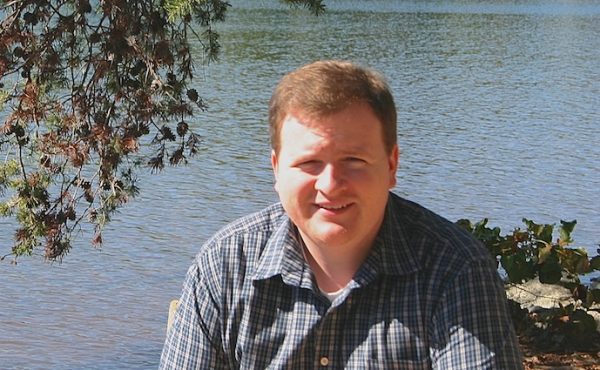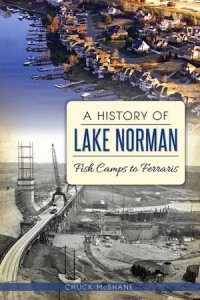UNC Charlotte Ph.D. Student’s Writing Weaves Stories of People’s Lives

History is woven from the threads of people’s lives.
For UNC Charlotte student, writer, researcher and historian Chuck McShane, the ability to tease out one thread has led to another, and another, and yet another – resulting in a book, magazine articles and academic research projects.
McShane draws upon his eclectic experiences, including a stint as a newspaper reporter, his current studies as a Public Policy Ph.D. student, his work with UNC Charlotte’s Urban Institute and knowledge and skills gained while earning his bachelor’s and master’s degrees in history from UNC Charlotte. He weaves his love of history, a researcher’s expertise and the journalistic background with a storyteller’s voice to shape his works.
While shying away from the title “academic historian,” McShane employs techniques used by historians in his research as a historical journalist. He often finds himself burrowed in libraries, digging through archives.
As a history major, he took this approach further, uncovering stories hidden within the communities that make up the Lake Norman area just north of Charlotte. As a writer for Charlotte Magazine covering the 50th anniversary of Lake Norman, he discovered stories that moved him. He decided to compile them into what he describes as the “first drafts of history.”
Somehow that wasn’t enough.
“After the first few people I talked to, I wound up with so much more than I could really contain in just 3,000 words,” McShane said. “I just wanted to keep writing about it and keep going through it.”
 The initial articles and his enthusiasm for the threads of history he found led to his book, A History of Lake Norman: Fish Camps to Ferraris, published in September 2014 by History Press.
The initial articles and his enthusiasm for the threads of history he found led to his book, A History of Lake Norman: Fish Camps to Ferraris, published in September 2014 by History Press.
McShane finds ways to knit together the narrative techniques he’s learned through historical research with the data analysis techniques from public policy. He also draws upon earlier experiences as a reporter for The Charlotte Observer, where he covered topics that would later emerge as themes in his book. These include the demographic dynamics behind small towns and how these communities were affected by the influx of people from the North moving into rural areas of the American South.
“There were all kinds of cultural conflicts that resulted because of that, and that was really fascinating to learn about,” he said.
As he wrote the articles, McShane said he was amazed at the depth of the history of Lake Norman that has long been forgotten.
“The stuff that’s underneath the lake is pretty interesting,” he said. “For instance, the fact that the Army decided to just blow up this old bridge and leave it under the water. And, just the way things used to be. People would just pull their cars up, dive in and take a swim. Now you can’t get any access to the lake except in very specific areas.”
The transformation of the American South is a central concept throughout his book, yet the main focus is on the history of Lake Norman itself. A project that was initiated by James B. Duke to convert what was once a river into an alternative energy source, Lake Norman is more than just a man-made lake and tourist attraction.
“The thing that fascinates me about Lake Norman is that it’s become this recreational area when really its original purpose was for electricity generation – a very economic, pragmatic reason – but it’s become so much more,” McShane said.
He believes it’s important for people to understand local history, and he hopes that his book will encourage people to become more involved in the history of their communities.
“I think local history can provide something for people who aren’t interested in academic history,” he said. “Providing a home angle or a national angle can get them more interested because then they can say, ‘Oh that happened on that corner ’or ‘That happened there.’ They can make the connection more clearly when it’s local because they have more of a stake in it if it’s local. It’s all about stories, really. It’s all about people.”
As he delved into the Great Flood of 1916, a unique historical event that took place around Lake Norman, McShane found the diary of a 17-year-old who lived during that time. When the man grew older, he published the diary as a memoir.
“I told the story through his eyes, and I also tried to come up with things I thought were turning points,” McShane said. “But within each milestone I had to find a way to keep the story going, because I didn’t want to just be listing facts.”
He also incorporated other perspectives to add depth. “Adding people is very important,” he said. “I tried to weave in people’s stories with the era. I wish I had been able to do more.”
McShane continues to write for Charlotte Magazine, where he’s been struck by inspiration once more as he works on a Charlotte history series. An article each month has explored this topic, and McShane has already begun the process of turning these works into a second book, which he hopes will be published next spring. He balances his writing and research with service on the planning board of his hometown of Davidson and other community service. McShane said that working on the board adds context for his public policy studies.
“My focus is on urban policy and development policy, and my work at the Urban Institute has been focused on planning issues in the Charlotte region,” he said. “As a resident of Davidson, I have a stake in what the town is going to look like. We moved to Davidson because we loved the town and we’d like to keep it that way as much as possible.”
McShane credits his liberal arts studies as shaping of his writing and research and the way he thinks.
“I think a true liberal arts education includes reading and writing about things that may not seem to have an obvious and immediate practical benefit,” he said. “Yet, it’s also about more practical things like science and math – and data analysis would include both – and I think that’s what my degrees at UNC Charlotte have helped me achieve. Really, though, the big benefit of liberal arts education is the focus on the broader world it gives you. I don’t know that I would have thought to pursue the opportunities I have if I had pursued a more skills-based approach.”
Words: Shaina Romain, College Communications Intern
Image by Laura McShane